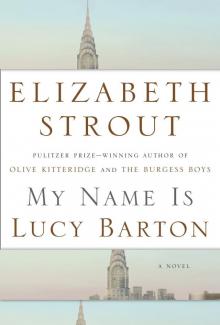- Home
- Elizabeth Strout
Olive, Again Page 14
Olive, Again Read online
Page 14
“Well, I still loved her,” Cindy said.
“Yuh. And I suppose Christopher loves me.” Olive shook her head slowly. The two women were silent for a few minutes. Olive held the towel in her lap.
Then Olive leaned forward and said quietly, “I will tell you this, Cindy. There are times I miss Henry so much I feel that I can’t breathe.” She sat back, and Cindy thought there might be tears in her eyes. Olive blinked, then she finally said, “I miss him so much, Cindy, right out of the blue—and it’s not because Jack isn’t good to me, he is, mostly—but something will happen and I will think Henry.”
“I’m awfully glad you came over,” Cindy said. “You wouldn’t believe the people who don’t come over to see me.”
“Yes, I would. Believe it.”
“But why don’t they come see me? I mean, Olive. Old friends don’t even come see me.”
“They’re scared.”
“Well, too bad!”
“Oh, I agree. I agree with you about that.”
“But you’re not scared.”
“Nope.”
“Even though you’re scared of dying.”
“That’s right,” Olive said.
* * *
The weather remained nasty; the wind whistled through the windows and it rained and then snowed briefly and then rained again. To Cindy it seemed like this went on for days. In the mail during this time she received a card from the librarians she had worked with. It had a flower on it, and inside it said, Get Well Soon! And everyone had signed their names. Cindy threw it into the wastebasket. The nurse came and changed the bed, and Cindy was glad to see her; they spoke briefly and companionably. But when the nurse finally left, Cindy got back into bed and pulled the covers up almost over her head. She listened to Pandora on her phone, with her earplugs in, which was something she did more and more. There was no sense today that she could read a book; she did not want to read a book. And she did not want to watch any movie on the iPad that Tom had bought her for that purpose.
Then she took her phone and texted her sons, who were both at the university. One more to go, she wrote, I love you both!! And in a few minutes, they had both texted back, We love you too, Mom. Her older boy texted again and said, Good luck with the last one! And she wrote back, Thank you honey!, and sent him a kiss emoticon. She wanted to write more, to say, But I really really REALLY love you! But there was no point in that. There were so many things that could not be said, and this had occurred to Cindy with more frequency and it made her heart ache. But she was very tired, and in a way that helped her, for she gave herself over to it, listening to her music on her phone. When she dozed, she did not feel herself fall asleep, and so she was surprised when she woke up.
Toward the end of the day, Anita stopped by on her way home from work, and Cindy sat at the kitchen table with her. Anita’s husband—Tom’s brother—might be losing his job, and Cindy said, “Anita, you have a lot of stuff going on,” and Anita said, “I do. And so do you,” and then Anita laughed; she had a burble of a laugh, and she pushed her glasses up her nose, and Cindy put her hand over Anita’s. “And Maria with those tattoos,” Anita said. “Up and down each arm, and I told her, Well, you just wait till that arm gets flabby. And she said, I’m getting them on my butt too—” Tom came through the door then, and Cindy asked if Anita wanted to stay for supper, and Anita said, “God, I would love to stay for supper.” And she got up and put her coat on. “But I got to feed that freakin’ family of mine.”
* * *
—
The next day the sun came out. It shone brightly as Cindy walked across the driveway to the car with Tom, who had taken the morning off to go with her for her last treatment, and she noticed the sun but almost nothing else, and she didn’t say much to Tom as he drove her to the hospital. Once there she sat as she had before, for more than an hour while the stuff was dripped into her, then Tom helped her get back into the car and he said, “I’m going to stay right with you, Cindy. All day.” Back at the house, Cindy got into bed, and pretty soon Tom came up the stairs and sat on the bed next to her. He was eating an apple, and Cindy could not stand the sound of it. He crunched the apple, and there were slurping sounds too, and she finally said, “Tom, can you finish that apple somewhere else?” And he looked hurt, and said, “Okay,” and went back downstairs.
* * *
Exactly a week after Cindy’s final treatment, Olive Kitteridge showed up, and she said, “Congratulations. What’s next?”
“A scan in three months. So we wait.”
“Okay, then.” After a moment, Olive said, “Jack and I had a fight. Boy, it was a whopper.”
Cindy said, “Oh, Olive, I’m sorry to hear that.”
“Yuh, well, I’m sorry to report it. It had to do with our friends. Our social life, as Jack put it.”
Cindy lay back on her cushions and watched Olive. Her face seemed to be moving; she was distressed. “You want to tell me?” Cindy asked.
“Well, he has these friends from his former life, the Rutledges, and I said the other night after we’d had dinner with them, There’s nothing wrong with Marianne Rutledge that a pin wouldn’t fix.” Here Olive raised her hand, fingers together, and made a jabbing motion in the air. “So stuffed up on herself, that woman, honest to good God. And he took offense! He took offense, and then he said, Well, Olive, your friends are rather provincial. He said that. He said that they never asked him about himself—God, what a male thing to say!—and that he found them to be pro-vin-ci-al. And I told him what was provincial was the fact that he cared that his daughter is gay—that he should be ashamed about calling anyone provincial when he feels that way, I said it’s more than provincial, Mr. Harvard Smarty Pants, it puts you right back in the Dark Ages. I got so furious that I got into the car and drove, and do you know where I thought I was driving to? Home! I thought I was going to drive back to where I used to live with Henry, and it took me a few minutes to realize that that house isn’t even there anymore. So I drove out to the Point, and I sat in the car, and I bawled like a baby, and then I drove back to Jack’s house, well, our house, I suppose, and— Here’s the thing. He was waiting for me, and he felt terrible. He felt awful that he had said those things.
“And I had been thinking about it on the drive back to the house, and I realized I’m a peasant and Jack is not. I mean, it’s a class thing. So when I got back and saw that he was so sorry, I told him that, the business about this being a class thing, very calmly, and do you know? We must have talked for two hours straight, we just talked and talked, and he said he was kind of a peasant too, and that’s why he was so sensitive about people being provincial, because all his life he had deep down felt provincial, and he didn’t want to be. He said, I’m a snob, Olive, and I’m not proud of that. His father was a doctor, you know, outside of Wilkes-Barre, Pennsylvania, and I thought that was hardly being a peasant, but his father was a general practitioner with an office in the back of their rather small house, and Jack said he felt like he never fit into the school there, and then his first wife, Betsy, well, she was to the manor born, she was from Philadelphia, a Bryn Mawr girl—”
Olive stopped talking. Then she said, “Well, we had a wonderful talk, is what happened.”
“I’m glad,” Cindy said. “But, Olive, what do you mean, you’re a peasant?”
“Well, I mean, I am not all la-di-da. My father never graduated from high school, though my mother was a teacher. But we were small-time people, and I’m proud of it. Now you better tell me something,” Olive said.
So Cindy told Olive that her hair should start coming back within a month. It would look like fuzz for a while, but then it would come back, and Olive looked at her with interest, nodding slightly.
Then Olive said, “Say, I’ve been meaning to ask. What about your sisters, Cindy? What happened to them? Didn’t you have a sister? Or two?”
Cindy was sur
prised that Olive remembered. She said, “Yes. One of them lives in Florida. She’s a waitress. And my little sister died many years ago—” Cindy hesitated, then said, “Of a drug overdose.” She added, “She’d had issues for years.”
Olive Kitteridge looked at her, and after a moment she gave a small shake of her head. “Godfrey,” she said. She crossed her ankles, turning her rump slightly on the chair. “Well, then I guess they don’t come and see you.”
“My sister-in-law comes. Anita. Honestly, Olive? She’s the only person other than you who has come to see me consistently.”
“Anita Coombs,” Olive said. “Sure, I know who she is. Works in the town clerk’s office.”
“That’s right.”
“Nice person. She always seemed that to me.”
“Oh, she’s wonderful,” said Cindy. “Boy, she has some problems. But who doesn’t?” And then Cindy sat up straighter, and she said, “Olive, did you tell me about that fight you had with Jack Kennison because you think I’m going to die?”
Olive looked at her with what seemed to be genuine surprise. After a moment she said, crossing her ankles the other way, “No, I told you because I’m an old woman who likes to talk about herself, and there was really no one else I felt comfortable telling.”
“Okay,” said Cindy. “I thought maybe you figured I was a safe person to tell because you thought I’m going to die, so why not tell her.”
Olive said, “I don’t know if you’re going to die.”
They were silent, and then Olive said, “I saw you had your Christmas wreath still up. Some people do that, I never knew why.”
Cindy said, “Oh, I hate that. I’ve told Tom so many times. Why can’t he remember to take it down?”
Olive flapped a hand through the air. “He’s upset, Cindy. He can’t concentrate on anything these days.”
And it was strange, but Cindy saw then that Olive was right. Such a simple statement, but it was completely true. Oh, poor Tom!, Cindy thought, Tom, I haven’t been fair to you—
But Olive had turned to gaze out the window. “Would you look at that,” Olive said.
Cindy turned to look. The sunlight was magnificent, it shone a glorious yellow from the pale blue sky, and through the bare branches of the trees, with the open-throated look that came toward the end of the day’s light.
But here is what happened next—
Here is the thing that Cindy, for the rest of her life, would never forget: Olive Kitteridge said, “My God, but I have always loved the light in February.” Olive shook her head slowly. “My God,” she repeated, with awe in her voice. “Just look at that February light.”
The Walk
About his children, something was wrong.
This came to Denny Pelletier as he walked alone on the road one night in December in the town of Crosby, Maine. It was a chilly night, and he was not dressed for it, having only a coat over his T-shirt, with his pair of old jeans. He had not intended to walk, but after dinner he felt the need in him arise, and then later, as his wife readied herself for bed, he said to her, “I have to walk.” He was sixty-nine years old and in good shape, though there were mornings when he felt very stiff.
As he walked, he thought again: Something was wrong. And he meant about his children. He had three children; they were all married. They had all married young, by the age of twenty, just as he and his wife had married young; his wife had been eighteen. At the time of his children’s weddings, Denny did not think about how young they were, even though now, walking, he realized that it had been unusual during that time for kids to marry so young. Now his mind went over the classmates of his children, and he realized that many had waited until they were twenty-five, or twenty-eight, or even—like the really handsome Woodcock boy—thirty-two years old when he married his pretty yellow-haired bride.
The cold was distracting, and Denny walked faster in order to warm up. Christmas was coming soon, yet no snow had fallen for three weeks. This struck Denny as strange—as it did many people—because he could remember his childhood in this very town in Maine, and by Christmastime there would be snow so high he and his friends would build forts inside the snow banks. But tonight, as he walked, the only sound was the quiet crunching of leaves beneath his sneakers.
The moon was full. It shone down on the river as he walked past the mills, their windows lined up and dark. One of the mills, the Washburn mill, Denny had worked in starting when he was eighteen; it had closed thirty years ago, and then he had worked in a clothing store that sold, among other things, rain slickers and rubber boots to the fishermen, and to the tourists, as well. The mill seemed more vivid to him than the store, the memories of it, though he had worked there not nearly as long as he had at the store. But he could remember with surprising clarity the machines that went on all night, the loom room he worked in; his father had worked as a loom mender there at the time, and when Denny began he had been lucky enough to go from sweeping the floors for three months to becoming a weaver and then, not long after, a loom mender as his father had been. The ear-splitting noise of the place, the frightening scoot a shuttle could take if it got out of place, whipping across the cloth and chipping pieces of metal; what a thing it had been! And yet it was no more. He thought of Snuffy, who had never learned to read or write, and who had taken his teeth out and washed them in the water trough, and then a sign had been put up: No Washing Teeth Here! And the jokes about Snuffy not being able to read the sign. Snuffy had died a few years ago. Many—most—of the men he had worked with at the mill were now dead. Somehow, tonight, Denny felt a quiet astonishment at that fact.
And then his mind returned to his children. They were quiet, he thought. Too quiet. Were they angry with him? All three had gone to college; his sons had moved to Massachusetts, his daughter to New Hampshire; there had seemed to be no jobs for them here. His grandchildren were okay; they all did well in school. It was his children he wondered about as he walked.
Last year, around the time of Denny’s fiftieth high school reunion, he had shown his eldest boy his yearbook, and his son had said, “Dad! They called you Frenchie?” Oh sure, Denny said, with a chuckle. “It’s not funny,” his son had said, adding, “Mrs. Kitteridge, way back in seventh grade, she told us this country was supposed to be a melting pot, but it never melted, and she was right,” and he had gotten up and walked away, leaving Denny with his yearbook open on the kitchen table.
Mrs. Kitteridge was wrong. Times changed.
But Denny, who had turned to walk along the river, now saw his son’s point: To be called “Frenchie” was no longer acceptable. What Denny’s son had not understood was that Denny had never had his feelings hurt by being called “Frenchie.” As Denny kept walking, digging his hands deeper into his pockets, he began to wonder if this was true. He realized: What was true was that he, Denny, had accepted it.
To accept it meant to accept much: that Denny would go to work in the mills as soon as he could, it meant that he did not expect to go on to school, to pay attention to his studies. Did it mean these things? As Denny approached the river, and could see in the moonlight how the river was moving quickly, he felt as though his life had been a piece of bark on that river, just going along, not thinking at all. Headed toward the waterfall.
* * *
The moon was slightly to the right of him, and it seemed to become brighter as he stopped to look at it. Is this why he suddenly thought of Dorothy Paige?
Dorie Paige had been a beautiful girl—oh, she was a beauty! She had walked the halls of the high school with her long blond hair over her shoulders; she was tall and wore her height well. Her eyes were large, and she had a tentative smile always on her face. She had shown up at the end of their sophomore year, and she was the reason Denny had stayed in school. He just wanted to see her, just wanted to look at her. Otherwise he had been planning on quitting school and going to work in the mill. His locke
r was not far from Dorie’s, but they shared no classes, because Dorie, along with her astonishing looks, had brains as well. She was, according to teachers, and even students said this, the smartest student to have come through in a long time. Her father was a doctor. One day she said “Hi” as they were at their lockers, and Denny felt dizzy. “Hi there,” he said. After that, they were sort of friends. Dorie hung around with a few other kids who were smart, and those were her real friends, but she and Denny had become friends too. “Tell me about yourself,” she said one day after school. They were alone in the hallway. “Tell me everything.” And she laughed.
“Nothing to tell,” Denny said, and he meant it.
“That’s not true, it can’t be true. Do you have brothers and sisters?” She was almost as tall as he was, and she waited there for him while he fumbled with his books.
“Yeah. I’m the oldest. I have three sisters and two brothers.” Denny finally had his books, and now he stood and looked at her. It was like looking at the sun.
“Oh wow,” Dorie said, “is that wonderful? It sounds wonderful. I only have one brother and so the house is quiet. I bet your house isn’t quiet.”
“No,” said Denny. “It’s not too quiet.” He was already going out with Marie Levesque, and he worried that she would show up. He walked down the hall away from the gym, where Marie was practicing—she was a cheerleader—and Dorie followed him. So at the other end of the school, near the band room, they talked. He could not now remember all they said that day, or the other days, when she would suddenly appear and they headed toward the band room and stood outside it and talked. He did remember that she never said he should go to college, she must have known—of course, “Frenchie”—that he did not have the grades, or the money, to go; she would have known because of the classes they were not in together, just as he knew she would go to college.

 The Best American Short Stories 2013
The Best American Short Stories 2013 Abide With Me
Abide With Me My Name Is Lucy Barton
My Name Is Lucy Barton Olive Kitteridge
Olive Kitteridge Anything Is Possible
Anything Is Possible Olive, Again (ARC)
Olive, Again (ARC) Olive, Again
Olive, Again